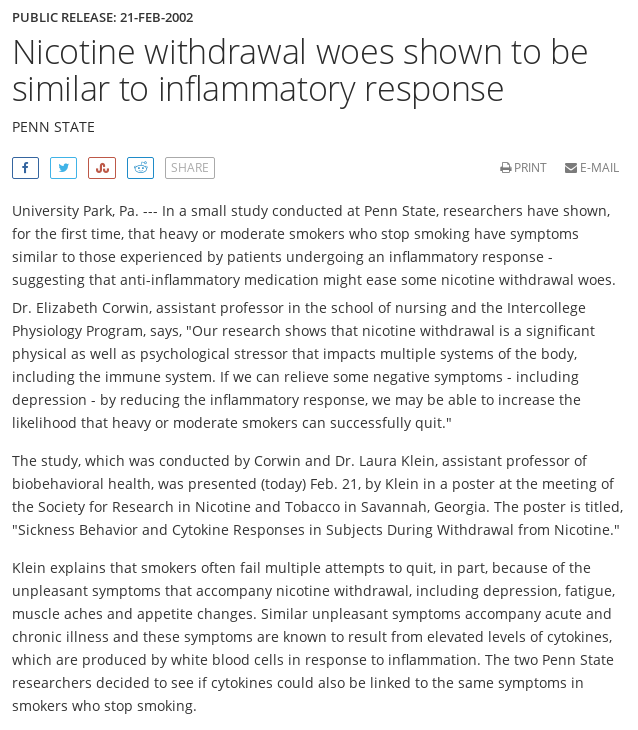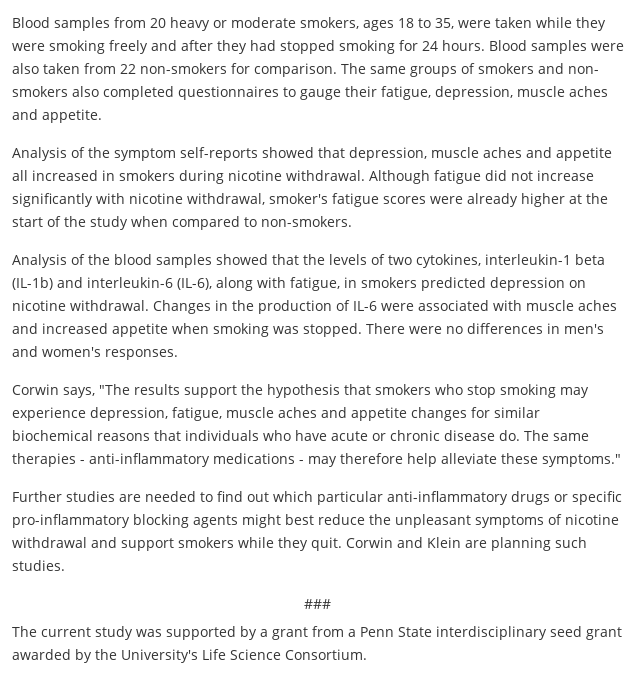Paradoxically enhanced survival among smokers reported in Chinese retrospective studies seems most likely explained by reduced IL-6 activity in smokers.
Chronic smoking apparently has immunosuppressant effects, which probably leads to less inflammation in severe COVID-19. https://twitter.com/__ice9/status/1244119447083900929">https://twitter.com/__ice9/st...
Chronic smoking apparently has immunosuppressant effects, which probably leads to less inflammation in severe COVID-19. https://twitter.com/__ice9/status/1244119447083900929">https://twitter.com/__ice9/st...
Nicotine itself suppresses IL-6 activity. Not sure what role other compounds in combustible tobacco product smoke may have. https://jneuroinflammation.biomedcentral.com/articles/10.1186/s12974-016-0725-1">https://jneuroinflammation.biomedcentral.com/articles/...
Another paper on nicotine suppressing IL-6:
https://www.ncbi.nlm.nih.gov/pubmed/20220107 ">https://www.ncbi.nlm.nih.gov/pubmed/20...
https://www.ncbi.nlm.nih.gov/pubmed/20220107 ">https://www.ncbi.nlm.nih.gov/pubmed/20...
Results are slightly mixed. In some tissue types or conditions, nicotine might increase IL-6 levels. I found one paper drawing this conclusion:
https://www.ncbi.nlm.nih.gov/pubmed/30317657
I">https://www.ncbi.nlm.nih.gov/pubmed/30... do not think this article is as relevant, though, due to the unusual umbilical vein cell line used.
https://www.ncbi.nlm.nih.gov/pubmed/30317657
I">https://www.ncbi.nlm.nih.gov/pubmed/30... do not think this article is as relevant, though, due to the unusual umbilical vein cell line used.
Another paper showing IL-6 suppression by nicotine:
https://colorectal-cancer.imedpub.com/abstract/nicotine-modifies-cytokine-production-by-human-mononuclears-stimulated-by-colon-cancer-cells-21421.html">https://colorectal-cancer.imedpub.com/abstract/...
https://colorectal-cancer.imedpub.com/abstract/nicotine-modifies-cytokine-production-by-human-mononuclears-stimulated-by-colon-cancer-cells-21421.html">https://colorectal-cancer.imedpub.com/abstract/...
Quitting smoking results in increased levels of IL-6 and other inflammatory markers:
https://www.eurekalert.org/pub_releases/2002-02/ps-nww022102.php
The">https://www.eurekalert.org/pub_relea... magnitude of withdrawal symptoms can be predicted to some degree from such elevated cytokine levels, which can cause depression, muscle pain, fatigue, etc.
https://www.eurekalert.org/pub_releases/2002-02/ps-nww022102.php
The">https://www.eurekalert.org/pub_relea... magnitude of withdrawal symptoms can be predicted to some degree from such elevated cytokine levels, which can cause depression, muscle pain, fatigue, etc.
The overall health risks of smoking, its negative effects in pneumonia and lung disease generally, the risk of acute and chronic lung irritation, and the high cost of tobacco products all strongly suggest not to treat smoking as a deliberate preventative measure -- obviously.
The role of nicotine specifically in suppressing IL-6 should also provide some indication to current smokers that switching to a generally safer nicotine RoA, such as unflavored electronic cigarettes, would likely not increase their vulnerability to inflammatory lung disease.

 Read on Twitter
Read on Twitter



